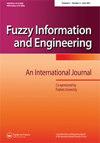基于哲学思维、创造力、数学自我效能感和数学自我概念的模糊回归预测数学成绩
IF 1.3
Q2 MATHEMATICS, APPLIED
引用次数: 1
摘要
摘要:本研究提出了一个柔性/软模型来探讨哲学思维、创造力、数学自我效能感和数学自我概念在预测数学成绩中的作用。为此,建立了模糊回归模型。两个常见的标准被用来评估得到的模型。此外,还解释了模型的可预测性。该案例研究涉及来自伊朗马兰的28名男学生(2015-2016年),他们参加了一项数学成绩测试。研究对象为理工科初中生,他们被要求回答关于哲学思维、创造力、数学自我效能感和数学自我概念的四份问卷。通过模糊回归分析结果发现,哲学思维与被试数学成绩不相关,而创造力、数学自我效能感、数学自我概念等变量与数学成绩呈正相关。本研究的结果为任何教育系统在规划学生数学成绩成长时提供建议。所建议的方法是通用的,因此它可以用于其他教育水平和研究领域。本文章由计算机程序翻译,如有差异,请以英文原文为准。
Fuzzy Regression in Predicting Math Achievement, Based on Philosophic-Mindedness, Creativity, Mathematics Self-efficacy, and Mathematics Self-concept
ABSTRACT The present study proposes a flexible/soft model for investigating the role of philosophic-mindedness, creativity, mathematics self-efficacy, and mathematics self-concept in predicting math achievement. To do this end, a fuzzy regression model is developed. Two common criteria are used to evaluate the obtained model. Moreover, the predictability of the model is explained. The case study involves 28 male students from Marand, Iran (year 2015–2016) who took part in a test of mathematics achievement. The participants were junior high-school students in science field of study who were asked to answer four questionnaires pertaining to philosophic-mindedness, creativity, mathematics self-efficacy, and mathematics self-concept. The analysis of the results through fuzzy regression revealed that philosophical-mindedness is not linked to participants' math achievement, while the variables of creativity, mathematics self-efficacy, and mathematics self-concept are positively correlated. The results of this study provide suggestions to any educational system in planning for students' math achievement growth. The proposed methodology is general, so that it can be employed in other educational levels and fields of study.
求助全文
通过发布文献求助,成功后即可免费获取论文全文。
去求助
来源期刊

Fuzzy Information and Engineering
Mathematics-Logic
CiteScore
2.30
自引率
0.00%
发文量
13
审稿时长
40 weeks
期刊介绍:
Fuzzy Information and Engineering—An International Journal wants to provide a unified communication platform for researchers in a wide area of topics from pure and applied mathematics, computer science, engineering, and other related fields. While also accepting fundamental work, the journal focuses on applications. Research papers, short communications, and reviews are welcome. Technical topics within the scope include: (1) Fuzzy Information a. Fuzzy information theory and information systems b. Fuzzy clustering and classification c. Fuzzy information processing d. Hardware and software co-design e. Fuzzy computer f. Fuzzy database and data mining g. Fuzzy image processing and pattern recognition h. Fuzzy information granulation i. Knowledge acquisition and representation in fuzzy information (2) Fuzzy Sets and Systems a. Fuzzy sets b. Fuzzy analysis c. Fuzzy topology and fuzzy mapping d. Fuzzy equation e. Fuzzy programming and optimal f. Fuzzy probability and statistic g. Fuzzy logic and algebra h. General systems i. Fuzzy socioeconomic system j. Fuzzy decision support system k. Fuzzy expert system (3) Soft Computing a. Soft computing theory and foundation b. Nerve cell algorithms c. Genetic algorithms d. Fuzzy approximation algorithms e. Computing with words and Quantum computation (4) Fuzzy Engineering a. Fuzzy control b. Fuzzy system engineering c. Fuzzy knowledge engineering d. Fuzzy management engineering e. Fuzzy design f. Fuzzy industrial engineering g. Fuzzy system modeling (5) Fuzzy Operations Research [...] (6) Artificial Intelligence [...] (7) Others [...]
 求助内容:
求助内容: 应助结果提醒方式:
应助结果提醒方式:


